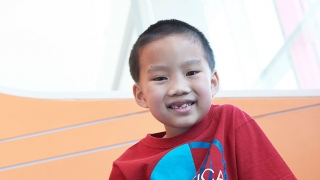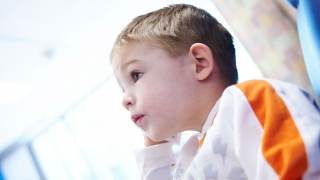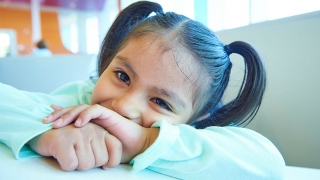Headaches in Children
What is a headache?
A headache is defined as persistent pain anywhere in the head or neck. Headaches are very common. A large study of American children found that one in four teenagers reported frequent or severe headaches within the past year.
What causes headaches in children?
Headaches can either occur on their own, or as a symptom of many different conditions. When headaches occur without any other illness, they are called primary headache disorders because the headache itself is the primary problem. Primary headache disorders include:
- Tension-type headache — the most common type of headache. The pain is mild to moderate, and feels like pressure.
- Migraine — severe and disabling headaches that can last for hours or days along with nausea, sensitivity to light, sensitivity to sound, and dizziness.
- Chronic migraine — frequent headaches (15 days per month or more) which occur for at least three months in a row. Often kids report they have a milder headache most of the time, and that the pain spikes up into a migraine on top of that pain.
- New daily persistent headache — chronic headaches that develop suddenly in children or teens with no past history of headaches.
- Post-traumatic headache — a headache that starts after a concussion and can produce symptoms similar to chronic migraine.
Headaches that are caused by another condition are called secondary headaches. For example, many headaches in children are due to infections, like the common cold or the flu. Serious causes of headache, like brain tumors, are extremely uncommon.
Most of the time, headaches can be easily managed with your child’s pediatrician or primary care provider. It’s very rare that your child’s headache is a sign of a serious or life-threatening problem.
Recurrent headaches, though, can interfere with your child’s school and social activities, and can affect your whole family.
Signs and symptoms of headaches in children
Headache symptoms can vary in frequency and severity, and may include:
- Mild, moderate or severe pain in the head or neck
- Throbbing or pounding pain
- Nausea and/or vomiting
- Sensitivity to light and/or sound
- One-sided sensory changes, called an aura, which may include changes in vision, numbness or tingling
Testing and diagnosis for headaches in children
If your child has frequent headaches that are interfering with his life or your family’s, you should see your child’s primary care provider. If necessary, your child’s primary care provider will refer you to a neurologist who has experience caring for children with headaches.
During the initial evaluation, the neurologist will:
- Review your child’s medical history
- Discuss symptoms, including severity and frequency
- Conduct a physical examination of your child
- Discuss other factors that might be contributing to headaches, such as diet, fluid intake, sleep patterns, activity level and stress related to family, friends and schoolwork
- Discuss possible treatment options
To get the most out of your evaluation, it is important that you or your caregiver are able to:
- Explain how headaches affect your life
- Keep track of how frequent your headaches happen (here is a helpful headache calendar)
- Describe how your headaches feel (e.g., sharp, throbbing, dull, pounding), how long they last, any other non-headache symptoms (light sensitivity, nausea, visual changes)
- Know what medications you’ve already tried and whether you think they have helped
If you are having frequent headaches that are interfering with school, work, and/or other activities, your healthcare provider can prescribe a daily medicine to help prevent headaches. Strong narcotic/opioid medications should never be prescribed for your headaches; medications that contain opioids can actually make headaches much worse. Read more in the Acute Medication section below.
Most children with typical headache histories and normal physical examinations do not need neuroimaging with brain CT or MRI. However, the need for neuroimaging will be discussed at your child’s initial visit.
Screening bloodwork or other tests for conditions that contribute to headaches may also be considered in some children.
Treatment for headaches
At Children’s Hospital of Philadelphia (CHOP), we have two groups of healthcare professionals who treat patients with headaches.
Community neurologists
These are doctors and nurse practitioners who are very experienced in caring for children with headaches. They can offer typical acute and preventive treatments and counsel you and your child on lifestyle changes that may minimize headaches.
Your child’s primary care provider may recommend a particular neurologist at CHOP with whom your provider already has a relationship.
The Pediatric Headache Program
The Pediatric Headache Program at CHOP specializes in providing comprehensive assessment and treatment for children with disabling and difficult-to-treat headaches. At the Pediatric Headache Program, an experienced team works in close collaboration to help improve your child’s headaches and quality of life.
At CHOP, we use a variety of treatment options to alleviate or minimize pain and disruptions caused by headaches, including:
Lifestyle modifications for headaches
It is very important for your child to follow a regular schedule that allows time for eating, sleeping, and exercising, in order to decrease the frequency of headaches. Although genetics can play a big factor in headaches, lifestyle triggers can worsen the severity and frequency of headaches.
How We Can Help
Children with chronic headaches often find it difficult to participate in normal activities. While it may feel impossible to go to school some days, children with chronic headaches do better if they regularly attend. Staying home can worsen headaches by increasing stress from missed schoolwork and interfering with regular sleep schedules. The structure and social interactions of school can also help improve headache symptoms.
Acute medications for headaches
Acute medicines work best if they are used as soon as your child begins to feel a headache episode start. However, taking acute medicines (even over-the-counter medications like acetaminophen or ibuprofen) more than two or three days per week can make headaches more frequent.
Acute medications include anti-inflammatory, anti-nausea and migraine-specific medicines. We often prescribe a combination of these medications.
Preventive medications for headaches
Preventive medications may be prescribed if your child consistently has more than one headache a week. These medicines must be taken every day, even if your child does not have a headache.
It can take two to three months for these medicines to be fully effective. We recommend continuing the medicine until your child’s headaches have been infrequent for six months.
Cognitive behavioral therapy for headaches
Headaches can interfere with your child’s mood over time. Cognitive behavioral therapy (CBT) can help your child develop positive thought patterns to help improve mood and make headaches better.
Combining CBT with medicine is more effective than taking medicine alone.
At CHOP, our psychologist uses CBT and other techniques to help patients decrease headache symptoms. We may also recommend a local psychologist or psychiatrist to provide additional support to your child and family. Please consult your insurance company for assistance with local referrals.
Procedural and intravenous treatments for headaches
If medication and CBT treatments have not helped, we may recommend procedural treatments such as a peripheral nerve blocks or Botox® injections. Sometimes we recommend IV medications for disabling headaches that have not improved with outpatient medicines. We will discuss these with you if we think one of these treatments may be appropriate for your child.
Follow-up care for headaches in children
Your child’s healthcare team will work together with you and your child to manage headaches. To maximize the effect of medicines, please follow the instructions we give you, give it time for prescribed medications to work, and return if the medicines aren’t working as expected or if there are side effects.
We know that it is tough for both the parent and child when headaches occur. We are here to help you on this journey. We will work together to help your child’s headaches. Please be patient and do not let the headaches stop your child from doing the things that he or she enjoys.
Reviewed by Christina Szperka, MD, MSCE


